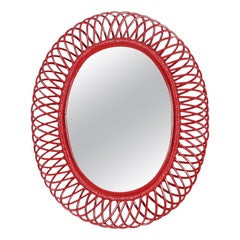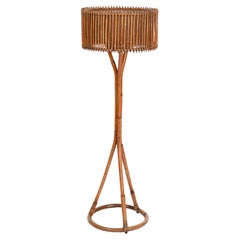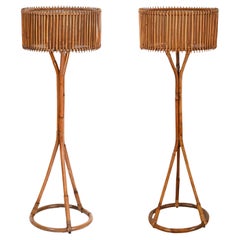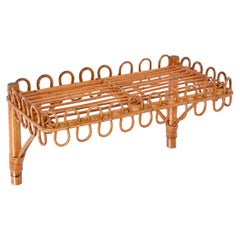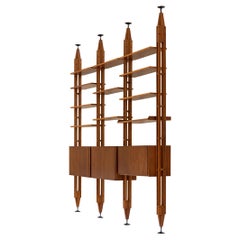Franco Albini Furniture
While working under the polymath Gio Ponti — arguably the most important figure in 20th-century Italian modernism — furniture designer Franco Albini nurtured a love for modern forms combined with traditional craft techniques.
Albini is widely known for working with organic materials such as rattan and cane for his chairs and other seating, but he also played a pivotal role in the Italian rationalist movement of the early 20th century, which saw architects and furniture makers applying a strict emphasis on geometry in their work. Rationalists drew on Ancient Roman architecture but rejected ornament, much in the way that Le Corbusier and celebrated Bauhaus figures such as Ludwig Mies van der Rohe had in their modernist furniture.
Albini received his degree in architecture from the Polytechnic University of Milan in 1929, and, in 1931, he founded his practice in Milan, where he tackled workers’ housing and other reconstruction projects. A gifted urban planner, he also developed the Palazzo Bianco, Palazzo Rosso and Tesoro di San Lorenzo museums in Genoa. While Albini is revered for his Margherita chair — a Triennale Milano award winner created for Bonacina in 1951 — he also collaborated with manufacturers Poggi and Cassina in the 1940s on seating, tables and more that embodied his artistic vision. Of that mid-century work, the one piece that perhaps best captures this vision is the iconic Luisa chair.
With its cherry red upholstery and sinuous wooden legs that seem to float aboveground, the Luisa is a genuine masterpiece. It is also a testament to Albini’s perfectionism, as it endured several prototypes — including one made by Knoll in the late 1940s — and took approximately 15 years to design. Poggi launched the final version of the armchair in 1955, earning Albini the prestigious Compasso d’Oro from Italy’s Association for Industrial Design. It is produced today by Cassina. Albini named the chair for someone who likely saw the process firsthand: his personal secretary of two decades, Luisa Colombini.
Find vintage Franco Albini furniture on 1stDibs.
1960s Italian Mid-Century Modern Vintage Franco Albini Furniture
Bamboo, Wicker, Cane, Rattan, Mirror
Mid-20th Century Italian Mid-Century Modern Franco Albini Furniture
Wicker, Fabric, Rattan, Bamboo, Canvas
Mid-20th Century Italian Mid-Century Modern Franco Albini Furniture
Fabric, Canvas, Bamboo, Wicker, Rattan
1960s Italian Mid-Century Modern Vintage Franco Albini Furniture
Bamboo, Cane, Rattan, Glass, Mirror
Mid-20th Century Italian Mid-Century Modern Franco Albini Furniture
Bamboo, Rattan, Wicker
1950s Italian Mid-Century Modern Vintage Franco Albini Furniture
Wood
Mid-20th Century Italian Mid-Century Modern Franco Albini Furniture
Bamboo, Cane, Rattan
1960s Italian Mid-Century Modern Vintage Franco Albini Furniture
Bamboo, Wicker, Rattan, Mirror
21st Century and Contemporary Italian Mid-Century Modern Franco Albini Furniture
Fabric, Wood
2010s Italian Mid-Century Modern Franco Albini Furniture
Wood
1950s Italian Mid-Century Modern Vintage Franco Albini Furniture
Cane, Rattan
Mid-20th Century Italian Mid-Century Modern Franco Albini Furniture
Bamboo, Wicker, Rattan
2010s Italian Mid-Century Modern Franco Albini Furniture
Wood
1950s Italian Mid-Century Modern Vintage Franco Albini Furniture
Rattan
1950s Italian Mid-Century Modern Vintage Franco Albini Furniture
Brass
1960s Italian Mid-Century Modern Vintage Franco Albini Furniture
Bamboo, Wicker, Rattan, Mirror
1950s Italian Mid-Century Modern Vintage Franco Albini Furniture
Upholstery, Rattan
1950s Italian Mid-Century Modern Vintage Franco Albini Furniture
Wood
1960s Italian Mid-Century Modern Vintage Franco Albini Furniture
Cotton, Cord, Sycamore
1950s Italian Mid-Century Modern Vintage Franco Albini Furniture
Fabric, Wood
Mid-20th Century Italian Mid-Century Modern Franco Albini Furniture
Mirror, Bamboo, Rattan
2010s Italian Mid-Century Modern Franco Albini Furniture
Metal
21st Century and Contemporary Italian Modern Franco Albini Furniture
Leather
Mid-20th Century American Mid-Century Modern Franco Albini Furniture
Steel, Chrome
1960s Italian Mid-Century Modern Vintage Franco Albini Furniture
Bamboo
2010s Italian Mid-Century Modern Franco Albini Furniture
Glass, Wood
21st Century and Contemporary Italian Mid-Century Modern Franco Albini Furniture
Metal
Mid-20th Century Italian Mid-Century Modern Franco Albini Furniture
Fabric, Canvas, Bamboo, Rattan
21st Century and Contemporary Italian Mid-Century Modern Franco Albini Furniture
Wood
1960s Italian Mid-Century Modern Vintage Franco Albini Furniture
Bamboo, Rattan, Mirror
2010s Italian Franco Albini Furniture
Wood
1950s Italian Mid-Century Modern Vintage Franco Albini Furniture
Wood
1960s Italian Mid-Century Modern Vintage Franco Albini Furniture
Fabric, Wood
1950s Italian Mid-Century Modern Vintage Franco Albini Furniture
Rattan
1950s Italian Mid-Century Modern Vintage Franco Albini Furniture
Wood
1960s Italian Mid-Century Modern Vintage Franco Albini Furniture
Fabric, Beech
1850s Italian Mid-Century Modern Antique Franco Albini Furniture
Wood
21st Century and Contemporary Italian Mid-Century Modern Franco Albini Furniture
Glass, Wood, Ash, Walnut
1950s Italian Mid-Century Modern Vintage Franco Albini Furniture
Wood
1950s Italian Mid-Century Modern Vintage Franco Albini Furniture
Bamboo, Rattan
2010s Italian Mid-Century Modern Franco Albini Furniture
Lacquer
1950s Italian Mid-Century Modern Vintage Franco Albini Furniture
Rattan, Glass
1960s Italian Mid-Century Modern Vintage Franco Albini Furniture
Bamboo, Rattan
2010s Italian Mid-Century Modern Franco Albini Furniture
Metal
1950s Italian Mid-Century Modern Vintage Franco Albini Furniture
Rattan
1950s Italian Mid-Century Modern Vintage Franco Albini Furniture
Fabric, Wood
Late 20th Century Unknown Mid-Century Modern Franco Albini Furniture
Bamboo, Glass
1920s Italian Modern Vintage Franco Albini Furniture
Chrome
2010s Italian Mid-Century Modern Franco Albini Furniture
Wood
2010s Italian Mid-Century Modern Franco Albini Furniture
Steel
1950s Italian Mid-Century Modern Vintage Franco Albini Furniture
Upholstery, Teak
20th Century Italian Mid-Century Modern Franco Albini Furniture
Rattan, Mirror, Wicker, Cane
Mid-20th Century Italian Mid-Century Modern Franco Albini Furniture
Bamboo, Glass
1950s Italian Mid-Century Modern Vintage Franco Albini Furniture
Brass, Iron
1960s Italian Mid-Century Modern Vintage Franco Albini Furniture
Fabric, Bamboo
2010s Italian Mid-Century Modern Franco Albini Furniture
Wood
1950s Italian Mid-Century Modern Vintage Franco Albini Furniture
Wood
21st Century and Contemporary Italian Mid-Century Modern Franco Albini Furniture
Wood
1930s Italian Mid-Century Modern Vintage Franco Albini Furniture
Steel
Late 20th Century American Modern Franco Albini Furniture
Chrome
Franco Albini furniture for sale on 1stDibs.
Creators Similar to Franco Albini
- What is rattan material?1 Answer1stDibs ExpertFebruary 13, 2024Rattan is one of the materials used to make wicker furniture and other furnishings. It comes from a plant that grows in hot, tropical regions of Africa, Asia and Australia. The quick-growing plant has a bamboo-like inner material that gets removed and fashioned into cane. Stalks of rattan (whose name derives from the Malay “rota”) are dense, steamable and bendable, which is why it lends itself to curvaceous designs and infinite creative uses in a way bamboo does not. Pieces of rattan furniture were welcomed indoors in the mid-20th century, and over time the medium has been put to use by giants of modernism such as Josef Hoffmann, Thonet, Jean-Michel Frank and Donald Deskey. Shop a wide variety of rattan furniture on 1stDibs.
